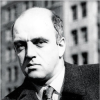James Fenton

James Fenton
James Martin Fenton FRSL FRSAis an English poet, journalist and literary critic. He is a former Oxford Professor of Poetry...
NationalityBritish
ProfessionPoet
Date of Birth25 April 1949
following forms goes indeed irregular known poet regular required rhyme scheme sequence whim
No poet is required to write in stanzas, or indeed in regular forms at all. Coleridge's 'Dejection: An Ode' has a rhyme scheme and sequence of long and short lines that goes without regular pattern, following the mood and whim of the poet. Such a form is known as an irregular ode.
alone artists modicum poem poet quite technology written
Working alone on a poem, a poet is of all artists the most free. The poem can be written with a modicum of technology, and can be published, in most cases, quite cheaply.
aware began draw eloquence figures period poets popular russian west writers
The 1960s was a period when writers in the West began to be aware of the extraordinary eloquence and popular attraction of the Russian poets such as Yevtushenko and Voznesensky - oppositional figures who could draw crowds. The Russian poets recited from memory as a matter of course.
accept begins continuity english people poetry time traditions
Some people think that English poetry begins with the Anglo-Saxons. I don't, because I can't accept that there is any continuity between the traditions of Anglo-Saxon poetry and those established in English poetry by the time of, say, Shakespeare. And anyway, Anglo-Saxon is a different language, which has to be learned.
advanced behind embarked left poetry reached
In the writing of poetry we never know anything for sure. We will never know if we have 'trained' or 'practised' enough. We will never be able to say that we have reached grade eight, or that we have left the grades behind and are now embarked on an advanced training.
baby poetry storks
Babies are not brought by storks and poets are not produced by workshops.
lines poetic relaxed
At somewhere around 10 syllables, the English poetic line is at its most relaxed and manageable.
doe great-poetry intricate
Great poetry does not have to be technically intricate.
age poet knows
Nobody really knows whether they are a poet. I knew I was interested from the age of 15.
language modern english-poetry
English poetry begins whenever we decide to say the modern English language begins, and it extends as far as we decide to say that the English language extends.
children writing poetry
The writing of a poem is like a child throwing stones into a mineshaft. You compose first, then you listen for the reverberation.
beautiful lyric-poetry musical
Lyric poetry is, of course, musical in origin. I do know that what happened to poetry in the twentieth century was that it began to be written for the page. When it's a question of typography, why not? Poets have done beautiful things with typography - Apollinaire's 'Calligrammes,' that sort of thing.
blank english good measured owes poetry series sound sounds subtle variations verse
The iambic pentameter owes its pre-eminence in English poetry to its genius for variation. Good blank verse does not sound like a series of identically measured lines. It sounds like a series of subtle variations on the same theme.
art ask perhaps second sounds work
'What is this', and 'How is this done?' are the first two questions to ask of any work of art. The second question immediately illuminates the first, but it often doesn't get asked. Perhaps it sounds too technical. Perhaps it sounds pedestrian.